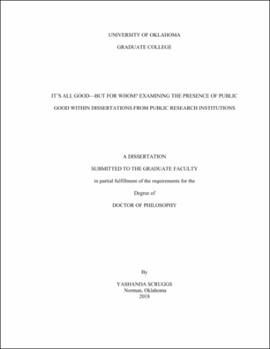| dc.contributor.advisor | Vargas, Juanita | |
| dc.contributor.author | Scruggs, Yashanda | |
| dc.date.accessioned | 2018-04-24T18:08:31Z | |
| dc.date.available | 2018-04-24T18:08:31Z | |
| dc.date.issued | 2018-05 | |
| dc.identifier.uri | https://hdl.handle.net/11244/299679 | |
| dc.description.abstract | The purpose of this exploratory research project is to explore if university research extends “beyond the walls” of research universities and seeks to address the social matters relevant to the greater community. The researcher examined knowledge development through research by analyzing dissertations from students who were enrolled in doctoral programs and attended public research institutions with clearly stated missions related to commitment to the public good. The researcher used constructivist grounded theory to analyze the data to explore how the greater community was considered or omitted through these research contributions.
By examining the data through three levels of analysis, the researcher was able to consider the way the data stood individually and collectively to paint a picture about the presence of public good in dissertations. The presence of public good work was most frequently seen by those students at HBCUs, and the presence of this work was often infused with a voice of advocacy. While there was a more proportionate representation of minority institution work in the data set, one would see that the HBCUs represent a smaller proportion of the number of institutions in the higher education system. However, such schools are offering more work for public good when compared to other institutional types. Despite having institutional missions that specifically state a commitment to research for the public good, overwhelmingly, the majority of the dissertations did not have explicit language showing work done for the public good.
In summary, this study demonstrated that many public research institutions are not paying attention to the public good in the ways that reflect institutional missions. This problem perpetuates inequity, the cycle of oppression, and does not serve the greater public community in the way that is consistent with respective institutional missions. The researcher argues that university professors and administrators must be intentional and consistent with their efforts to aid the greater community -- this includes educating graduate students about research design, institutional mission, and the importance of research for the public good.
The work presented in this study has the potential to (1) modify current teaching practices, (2) expand public good themes, (3) revise institutional policies and practices to support public good work, and (4) strengthen the communication with and service for the benefit of the public good. | en_US |
| dc.subject | public good, graduate work, research | en_US |
| dc.title | IT’S ALL GOOD—BUT FOR WHOM? EXAMINING THE PRESENCE OF PUBLIC GOOD WITHIN DISSERTATIONS FROM PUBLIC RESEARCH INSTITUTIONS | en_US |
| dc.contributor.committeeMember | Houser, Neil | |
| dc.contributor.committeeMember | Vaughn, Courtney | |
| dc.contributor.committeeMember | Houston, Derek | |
| dc.contributor.committeeMember | Edwards, Kirsten | |
| dc.date.manuscript | 2018-04-23 | |
| dc.thesis.degree | Ph.D. | en_US |
| ou.group | Jeannine Rainbolt College of Education::Department of Educational Leadership and Policy Studies | en_US |
| shareok.nativefileaccess | restricted | en_US |
